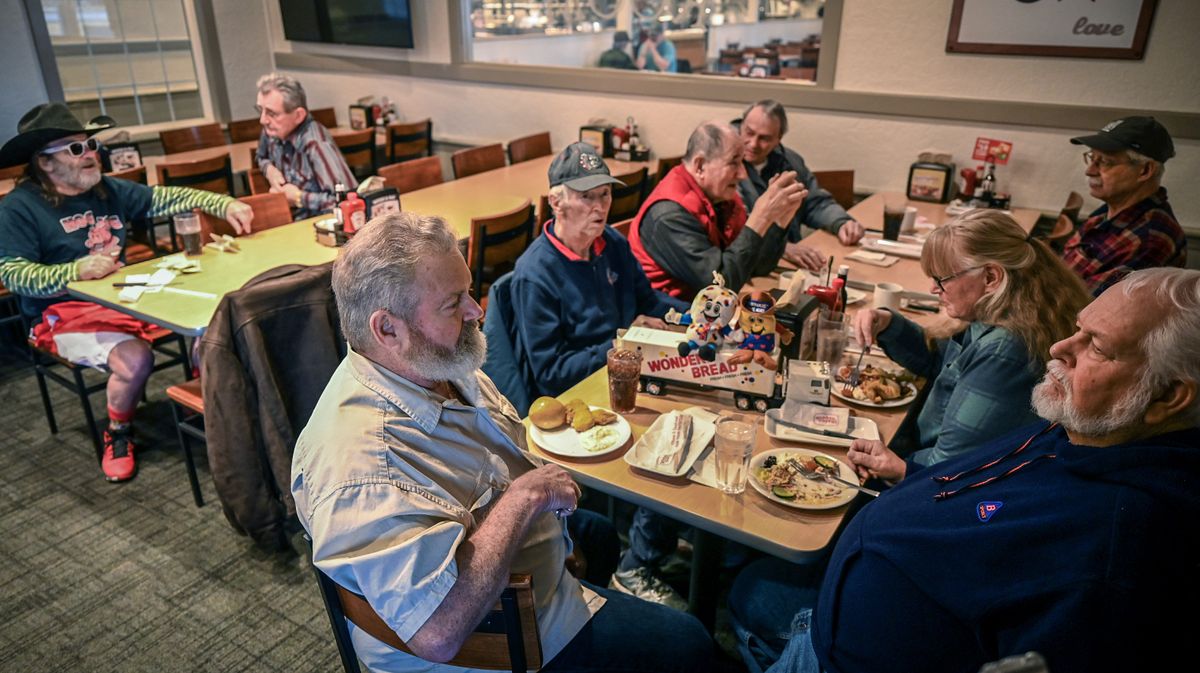Slice of their lives: Retired Wonder Bread employees reminisce and socialize at monthly lunches

Listed on the Spokane Register of Historic Places, the Wonder Building at Post and Broadway no longer emits the heady fragrance of freshly baked bread.
The iconic red brick structure, built in 1909, housed the Spokane Bakery. In 1925, Continental Baking Co. bought it and began making the first fortified bread from its newly acquired Wonder brand. In 1995, Interstate Bakeries Corp. bought the company, and by 2000, all the ovens were shut down.
When the bakery closed its doors, Dennis Johnston wasn’t ready to say goodbye to his coworkers. He decided to launch a monthly gathering of former employees.
“I just started calling people,” he said.
The group meets for lunch to reminisce and catch up.
John Sullivan enjoys the get-togethers.
“Just knowing they’re still alive is great,” he said, grinning.
At their February meeting, a plush Freddy the Fresh Guy mascot sat atop a toy Wonder Bread semi, along with his pal Twinkie the Kid.
The mascots were one reason Sullivan got a job. The bakery employed three generations of his family.
“My grandfather worked there, and he got Dad a job,” recalled Sullivan. “I’d just graduated from Shadle, and my dad asked me if I wanted to be Freddy the Fresh Guy. I ended up in production – I didn’t even fill out an application until lunchtime!”
Instead of donning a costume, he got an education about the ins and outs of the bakery.
“I made the mistake of learning everything I could,” he said.
Moving around from one area to the next did provide a welcome benefit.
“I got to work with a lot of different people,” said Sullivan. “It was a good living.”
But the Sullivan Wonder Bakery buck stopped with him.
“My son said nope!”
His father donated the mascot costumes to the owners of the revamped Wonder Building.
The bakery was a family affair for Johnston, too.
“My three brothers worked there,” he said. “My brother, Bob, worked 23 years without missing a single day.”
Johnston ran the bun machine.
Dennis Neill nodded at the memory.
“Oh, you became one with the bun machine,” he said. “It was a fast-paced machine.”
Neill worked for 20 years for the company at three different bakeries.
“I was still there in 2000 when it closed.”
Likewise, engineer Ken Pope. He started at the bakery in 1978.
“I was one of the last guys with the keys,” Pope said. “I liked the people. The job was good for us.”
For fellow engineer Andy Zaburski the best part of the job is that he’s not allergic to flour.
He moved to Spokane from California.
“I was allergic to the chemicals at the plant I worked at in California,” he explained.
Jack Cross was a bread wrapper and he can tell you exactly how long he worked at the bakery.
“Twenty-nine years and nine months,” he said.
He vividly remembers the heat of the place.
“Loading ovens,” he shook his head. “It was so hot! I had to ask the foreman for a pair of gloves because I didn’t have any.”
That scorching heat was accompanied by the aroma of bread, cookies and snack cakes fresh from the oven.
“I miss that smell,” said Pope. “And the cookie department!”
Not all of the items they baked turned into successes. The men recalled carrot cake and pudding cakes that failed to catch on.
But until wheat bread became popular, pillowy soft white Wonder Bread was the company’s staple.
“I miss the bread,” Sullivan said. “It was the best bread.”
You can still buy it, but the former employees doubt it tastes the same. Hostess, the company that produced the bread as well as popular snack cakes like Twinkies and Ding Dongs, went bankrupt in 2012.
“They sold the recipes to the highest bidder,” Neill explained.
Sometimes, the employees got to sample new items.
“Every now and then, there’d be a test bread,” recalled Cross.
The workers were allowed to take some home to share with their families and friends. In 1969, when Cross worked there, the loaves were quite a bargain compared to today’s prices.
“Wonder Bread cost 21 cents a loaf,” he said. “Private label (store brand) bread cost 17 cents.”
As the former coworkers finished their lunches Pope reflected on the best part of their monthly gatherings.
“The old stories,” he said. “We worked together, and we were like family.”
Sullivan nodded.
“We grew up there,” he said.